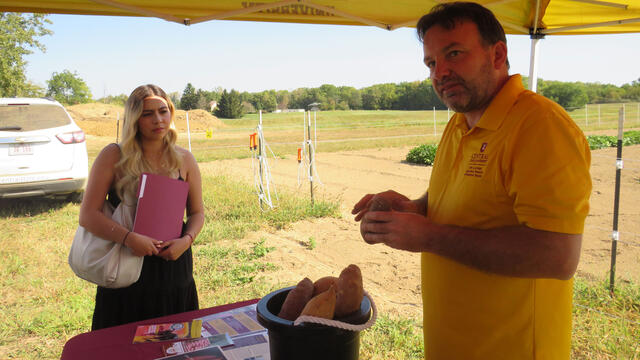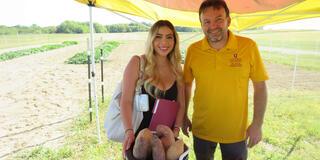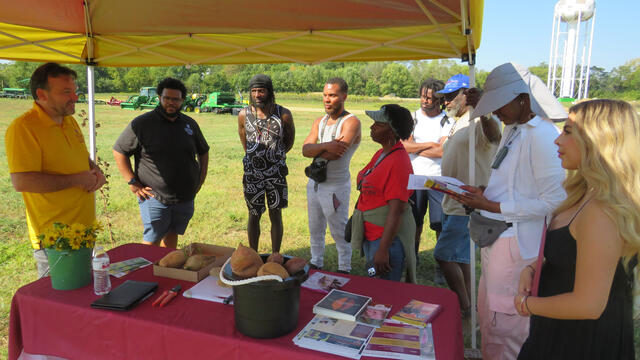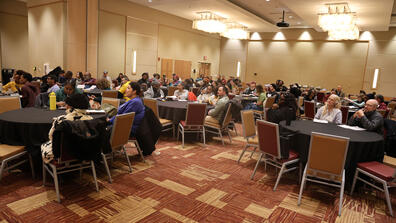
Six Questions for Visiting, Budding Agricultural Economist

Andrea Minerva Del Toro Reyna is a second-year master’s student in Agricultural and Natural Resource Economics at Universidad Autónoma Chapingo, Mexico, where she expects to graduate by the end of 2025. She earned her bachelor’s degree in Economics from Universidad Autónoma del Estado de México (UAEMex) in 2022. Her current master's thesis research focuses on a comparative analysis of the adoption of Business Intelligence (BI) tools by micro, small, and medium-sized enterprises (MSMEs) in both Mexico and the United States. The goal of her study is to propose strategies that could help MSMEs leverage BI to strengthen their competitiveness and make better, more informed business decisions. Reyna spent two weeks on Central State University's Wilberforce campus in September, collecting data from producers in Ohio on the adoption of BI tools for her research.
Dr. Cyril Ibe, Land-Grant interim communications coordinator, emailed Del Toro Reyna questions, and she provided responses, which have been edited lightly for both brevity and clarity.
What inspired you to focus your master’s research on Business Intelligence (BI) tools for micro, small, and medium-sized enterprises (MSMEs)?
I was inspired to focus my research on Business Intelligence (BI) tools for MSMEs because of their critical role in economic growth and job creation, especially in emerging economies such as Mexico. MSMEs represent the vast majority of businesses—far more than large corporations—and they are essential for local development and community well-being. Despite this importance, they often struggle with limited resources, low access to technology, and insufficient training to fully benefit from data-driven management. I recognized that BI, which has traditionally been used by large corporations, could be adapted to meet the specific needs of smaller enterprises. By exploring this topic, I aim to provide practical and accessible strategies that allow MSMEs to use BI to strengthen their competitiveness, improve efficiency, and make better-informed decisions.
Why do you believe MSMEs, especially in the agricultural sector, require customized BI models rather than adopting existing corporate solutions?
I believe MSMEs in the agricultural sector require customized BI models because their context, resources, and needs are very different from those of large corporations. Existing corporate BI solutions are often too costly, complex, and resource-intensive for small businesses, which usually lack advanced infrastructure, specialized staff, or large budgets. Moreover, MSMEs operate with greater flexibility and closer relationships with their customers, which calls for BI tools that are simpler, more accessible, and adapted to their realities. In the agricultural sector in particular, many producers face additional challenges such as limited digital skills, connectivity issues, and market volatility. Therefore, customized BI models can provide practical, affordable, and context-sensitive solutions that empower MSMEs to adopt data-driven practices, strengthen their competitiveness, and ensure their long-term sustainability.

What inspired or motivated you to focus your master’s program on agricultural economics?
I was motivated to pursue agricultural economics because of its crucial role in addressing issues that directly affect both people and communities. Agriculture is not only the foundation of food security but also a key driver of rural development and economic growth. I became interested in understanding how economic tools and research could be applied to improve efficiency, sustainability, and competitiveness in this sector. This field allows me to combine my background in economics with my passion for supporting small producers and enterprises, particularly in rural areas, to overcome challenges and seize opportunities in an increasingly globalized and digitalized world.
How do you expect your time at Central State University to contribute to your research?
My time at Central State University will contribute to my research by providing both academic and practical opportunities. First, it allows me to engage directly with U.S. scholars and professionals who have experience in agricultural economics and data-driven business practices, enriching the comparative perspective of my study. Second, it gives me the chance to interact with local MSMEs and farmers in Ohio, collecting insights on how they adopt and use Business Intelligence tools.
This experience will not only strengthen the empirical part of my research but also allow me to identify strategies that could be adapted to the Mexican context. Overall, CSU offers an environment that will help me broaden my perspective, validate my methodology, and strengthen the relevance of my findings.
How does the Central State University environment compare with your expectations before you arrived on campus?
Before arriving at Central State University, I expected a welcoming academic environment where I could learn and collaborate with faculty and students. Since being here, I have found that the environment not only met but exceeded my expectations. The campus community has been very supportive, and I have had access to valuable academic resources, mentorship, and networking opportunities. This has created a positive and motivating atmosphere that has enriched both my academic and personal experience.

What are your long-term career goals, and how does your current research align with them?
My long-term career goal is to pursue a Ph.D. focused on agricultural economics and digital transformation, in order to continue developing research that supports MSMEs in adopting Business Intelligence and other technologies to improve their competitiveness. I envision contributing to both academia and policy by producing knowledge and strategies that help smaller enterprises overcome barriers and take advantage of data-driven tools. My current research directly aligns with these goals because it examines how BI can be adapted for MSMEs, particularly in the agricultural sector, and compares experiences between Mexico and the United States. This provides a strong foundation for doctoral research, teaching, and policy recommendations aimed at strengthening MSMEs through innovation and digitalization.


